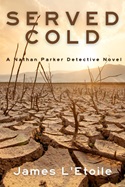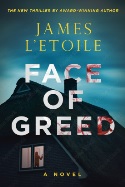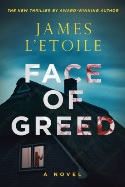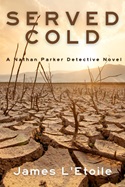 Synopsis:
Synopsis:
Detective Emily Hunter must be the voice for the voiceless.
Homeless camps spread throughout the city of Sacramento are the topic of heated debate among residents. They’re considered undesirable, a nuisance, an eyesore. When the camps fall victim to a string of devastating arson attacks, Detective Emily Hunter and her partner, Javier Medina, are assigned to conduct the investigation and, in the process, they become acquainted with the real people whose lives have been destroyed.
The attacks only begin to draw attention when two of the victims are identified as the city’s former anti-homeless Mayor and a camp social worker. But rather than strengthening the push for justice, the movement to completely abolish the camps actually intensifies. And the investigation becomes politically charged when Emily discovers just who stands to gain from burning the homeless out of their shelters.
As Emily struggles to balance the demands of the high-stakes investigation with caring for her Alzheimer’s-stricken mother, whose condition is rapidly deteriorating, the investigation uncovers an unlikely suspect and a reluctant witness standing between Emily and the shocking truth.
Can Emily overcome resistance and her personal obstacles to halt the attacks?
Review:

Author James L’Etoile introduced readers to Detective Emily Hunter in Face of Greed, welcoming the challenge of bringing Emily to life, in part, because he believes that women in law enforcement, which is still a male-dominated profession, have never received the recognition they deserve. That aspect of Emily’s career is an integral component of her character, and her desire to succeed, despite sometimes being underestimated and even marginalized, is fierce.
In the second installment in L’Etoile’s engrossing series, River of Lies, Emily again finds herself striving to balance her professional endeavors and her personal responsibilities. She is now a seasoned Detective with the Sacramento Police Department and has forged a solid relationship with her partner, Javier Medina. They have a strong mutual respect for each other’s expertise and work ethic, and care deeply about each other. They have gotten to know each other well, and their frequently hilarious bantering is believably affectionate, often comparable to that of siblings who frustrate each other but would never permit anyone to threaten their strong bond. Their respective dating lives are often the subject of teasing, especially given that Javier’s mother is determined to find the ideal wife for her still-single son.
Emily is still dating handsome Officer Brian Conner, with whom she became involved in Face of Greed, and they are gradually growing closer. She remains deeply committed, of course, to providing the best possible care for her mother, Connie, a retired teacher afflicted with early onset Alzheimer’s disease. In a relatable sub-plot, Emily continues to grapple with the grim reality that Connie’s condition is only growing worse with no possibility of improvement. The emotional strain of being fully responsible for Connie’s care again bears down on Emily when she discovers that the facility in which Connie has been residing is no longer an adequate or safe option. Once again, she finds herself juggling her mother’s daily needs against her professional obligations, and relying upon the generosity and affection of others who are willing to assist. It is a storyline that many readers will find heartbreakingly realistic and familiar.
But the real focus of this volume is the work of an arsonist targeting homeless encampments. L’Etoile says that the story was inspired by his experience serving with the California Department of Corrections and Rehabilitation’s Division of Adult Parole Operations. He and his colleagues were charged with devising strategies for monitoring unhoused parolees living in camps while “politicians wanted to ignore that population or thought they could legislate the social issues away.” While performing his duties he toured various encampments, including one in Los Angeles which was at that time the largest of its kind in the nation. He wondered “what stories, tragedies, and long-kept secrets were hidden in the tents and carboard shelters” he observed.
Sacramento, like so many American cities, has a significant number of unhoused residents and, given that both the American and Sacramento Rivers run through the city, large camps are established along the waterfronts. But someone wants to eradicate those camps – and the inhabitants – and is willing to do so using violent means. As the book opens, a young mother, Lisa, has been living with Willow, her eight-year-old daughter, in various camps for two years. She is despondent, convinced she has failed herself and her daughter. As she is getting Willow to sleep in their tent, she hears a commotion and sees that fire has broken out on the opposite side of the camp. It is “always a risk in the cardboard condos and plastic tarp shelters along the riverbank,” but Lisa sees two men who, unlike the camp’s residents, are not attempting to run to safety. Rather, one of them is setting tents ablaze, and the other is swinging an aluminum baseball bat at anyone who tries to stop him. Before the raging fire is extinguished, the camp is completely destroyed, Lisa is seriously injured, along with sixteen other inhabitants, one man is dead, and Willow has run away.
It’s the third such arson attack in two weeks. And the dead man did not succumb to his burns. He was shot in the back of the head.
When Emily and Javier are assigned to investigate the series of fires, they once again find themselves embroiled in a political quagmire. The Chief of Police and newly elected Mayor are focusing on the investigation, expecting results, and media attention is growing. When more camps are obliterated and the former Mayor becomes a victim, the mystery surrounding the crimes intensifies. What was he doing at a homeless camp? And why is the City so quick to conduct clean-up operations, eradicating any evidence left at the crime scenes and impeding the investigation?
Emily, savvy and, along with Javier, respected by her immediate superior who is supportive and willing to run interference with management, again demonstrates both a commitment to the case and willingness to take risks to uncover the truth. They both approach their work with the appropriate blend of detachment and compassion, skepticism and empathy. L’Etoile’s law enforcement credentials and investigative experience are on full display in this tautly constructed procedural drama. He details the step-by-step work Emily and Javier perform as they search for answers without slowing down the story’s pace or lapsing into tedium. Rather, the evidence they discover logically leads to successive inquiries as they gradually piece together a complex and intriguing scheme designed to bring new development and prosperity to the River City. But at a tremendous human cost. L’Etoile deftly identifies potential perpetrators and possible motives that propel the story forward and keep readers guessing.
Once again, L’Etoile seamlessly melds the procedural and political aspects of the story, tackling several contemporary and controversial social conundrums. There is no denying that homelessness is a considerable problem in the United States, and various approaches have been debated and implemented, but have failed to provide a solution. Through his characters’ plights and positions – powerless to extremely powerful and influential – L’Etoile illustrates that there is no easy fix and the unhoused are too often repeatedly and cruelly victimized while guileless politicians preen and advance their own self-interest.
River of Lies is another propulsive thriller featuring the indomitable and endearing Emily and Javier. Her struggles are credible, her relationships believable, and her work as a detective impeccable. She is a multi-layered, fully formed protagonist and L’Etoile has wisely surrounded her with a supporting cast of characters in whom readers are equally willing to emotionally invest, especially Connie, whose increasingly fleeting lucid interactions with Emily are genuine and touching. Hopefully, L’Etoile will soon deliver a third installment in this entertaining and thought-provoking series.
Excerpt from River of Lies
Chapter One
It would be easy to float away in the darkness and let the current pull her under, too. She’d thought about it several times before — in her “dark times,” as her ex-husband used to call them.
Lisa’s life hadn’t turned out the way she’d hoped. Abusive parents, a failed marriage, the booze — so much booze — all swirled together to set her on this path. Losing her apartment finally put her out here. Now this. She thought she’d escaped, but running from her past hadn’t worked. The ghosts of years past had stripped everything away. Lisa had nothing left, not even hope.
The tug of the Sacramento River on her legs was temping, and the spring snow runoff numbed Lisa’s thighs as she waded out.
Lisa closed her eyes and pictured herself lying back and allowing the river to put an end to it.
“Momma?”
Lisa’s eyes shot open.
Glancing over her shoulder, she spotted the faint outline of her daughter standing on the riverbank. The eight-year-old wore a thin blue t-shirt with a unicorn on the front, a threadbare pair of jeans, holding a stuffed bunny with one ear missing. The girl’s face registered confusion.
“Baby, go on back to the tent,” Lisa said.
Lisa felt her daughter would be better off without her. The mother’s sins cast a damning shadow. But she couldn’t abandon Willow. Not like this. Lisa knew what it was like to be an orphan in an unfriendly world. The future of an eight-year-old alone in a homeless camp wasn’t the life Willow deserved.
“Momma, what are you doing?”
Lisa’s eyes welled. She didn’t need to tell her daughter the world was a hurtful place. She’d keep the secrets and not let her know there was nothing worth living for — for now.
“I’m coming, baby.”
Lisa turned and waded back toward the bank. Her daughter spent the last two years in one homeless camp or another. The tightly packed shelters made Lisa’s claustrophobia itch.
Lisa reached for her daughter and grabbed her, lifting the girl into a tight hug. Tears streamed down Lisa’s cheeks. Not because Lisa wanted to end her suffering. She’d considered that option before. The tears came from nearly making Willow an orphan and leaving the innocent girl behind in a homeless camp. Willow couldn’t fight off the predators who lurked in the darkness—like they did tonight.
From the river’s edge, the camp spread a quarter mile in either direction. There was never any official count because people came and went, died, were arrested, or simply disappeared from the camp. Lisa guessed there were over two hundred people living here in the city’s forgotten shadows.
It was time to move. When the camps get too big, bad things happen, and people talk.
Lights flickered from small campfires and lanterns throughout the settlement. Lisa thought they looked like fallen stars. She hugged Willow a little closer and followed the trail back into the camp.
She unzipped the fly on their tent and scooted inside. Their belongings — a change of clothes, a towel to share, and two children’s books lay on one end of the nylon dome tent. A pair of sleeping bags took up most of the space. Lisa knew they were lucky to have them — others didn’t.
“All right, sweetie, let’s get you settled in for the night.”
Willow wiggled into her sleeping bag with her stuffed rabbit. Lisa grabbed a book, The Mouse and the Motorcycle, one of her daughter’s favorites. The eight-year-old could recite most of the story by heart.
Lisa opened the book when a loud commotion erupted outside. It wasn’t uncommon in the camp. Fights over property, drugs, or imagined slights fed by drugs, alcohol, and glitchy mental health were a daily occurrence. Lisa learned the best thing to do was stay out of it and never get involved.
It sounded like the usual dust-up until the screams began.
“Stay here, Willow.”
Lisa crawled to the tent flap, zipped it open, and poked her head out.
Fire.
Flames erupted on the far side of the camp. It was always a risk in the cardboard condos and plastic tarp shelters along the riverbank. This was different. At least six structures were ablaze. People were running, backlit by the orange and yellow glow. The evening delta breeze fanned the flames, igniting another dozen tents.
The cheap nylon shelters went up like dried rice paper.
“Baby, get your shoes on.”
“What is it, Momma?”
“We need to —”
Lisa spotted two men in the chaos, both outlined by the flames behind them. They weren’t running. One set the next row of tents ablaze. The second man wielded a baseball bat and swung the aluminum cylinder at anyone who came near. A sickening tink sound echoed among the rows of tents when he bounced the bat off a man’s shoulder.
Lisa grabbed her daughter’s hand, pulling her from the tent. The girl’s eyes grew large when she spotted the fires.
Willow pulled away and ducked back into the tent.
“Willow Marie, don’t you pull away from me. Come here. We need to get away.”
Lisa felt the heat from the fire. It was spreading fast, and the flames jumped up into the trees within the camp.
Bending into the tent, Lisa found Willow gathering her stuffed animal and the books.
“Come now, we need to —”
Tink.
Lisa fell flat on the ground. The rounded end of the baseball bat shoved at her ribs. Dazed from a blow to the head, she didn’t move. Lisa registered a man’s boot stepping over her.
The flames grew closer.
Willow’s fear backed her into the far corner of the tent.
Lisa’s ragged voice called to her daughter. “Willow. Listen. I need — I need you to run. Hide. Go to the safe place — the rock where we hide things. Stay until I come for you.”
“I don’t want to go. I’m scared.”
“I know, baby. You have to be brave. Take Mr. Bunny and go, now.”
Willow clutched her stuffed animal, the book, and stepped through the tent flap.
“Momma, you have an owie.”
“I know, baby. I’ll be okay.”
It was a lie. Lisa knew she was far from okay. She could feel the pressure in her head building with each heartbeat.
“Go to the place we talked about, honey. Go quick.”
Willow’s eyes welled. She didn’t budge, frozen in fear before a scream from someone nearby broke her from the trance. Another row of tents went up in flames.
“Go.”
Willow hugged her bunny and trotted toward the river. Lisa lost sight of her through the smoke billowing through the camp.
She tried to get up and couldn’t move her legs. She crabbed forward using her arms, inching away from the burning camp.
Her tent flashed, and the flames consumed it in seconds. The melting fabric, plastic and nylon fibers fell on her. The molten material burned through her clothing and ate into the flesh on Lisa’s back.
The pain seared into her. Screams around her meant she wasn’t the only one. The two arsonists headed in the same direction Willow had fled.
“Stop them,” she cried. No one could hear over the chaos of the burning camp.
Lisa now wished the water had brought a calm end to everything. She didn’t expect this — the fire, searing flame, and torture. Part of her believed she deserved this fate for the pain she’d caused. Willow didn’t. The girl didn’t understand. Now, Lisa worried about what would happen to her sweet little girl. Mr. Bunny would not be enough.
The last thought before the flames ate at her pant legs. “I’ve failed you.”
Excerpted from River of Lies by James L’Etoile. Copyright © 2025 by James L’Etoile. Published by Oceanview Publishing. All rights reserved.
Also by James L’Etoile:
Detective Nathan Parker Series
Detective Emily Hunter Series













1 Comment
Amazing review. I am reading this right now!